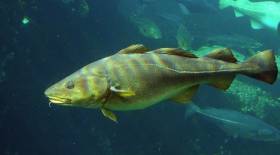Displaying items by tag: Fish Revolution
#PublicLecture - 'The Little Ice Age and the North Atlantic Fish Revolution' is the title of a public lecture delivered by Prof Poul Holm and Dr Francis Ludlow of Trinity College Dublin at lunchtime this Wednesday 13 April at the Marine Institute headquarters in Oranmore, Co Galway.
Holm is Professor of Environmental History at the School of Histories and Humanities in TCD. In 2015 he was awarded an Advanced Grant of €2.5 million by the European Research Council. In the next five years he and his team will explore the North Atlantic 'fish revolution' circa 1400-1700 AD.
In 1497, John Cabot returned to Bristol from a voyage across the North Atlantic. He told of waters so thick with fish that they could be lifted straight on board in baskets. Within a few years of this journey, fishermen from all over Western Europe made the journey across. This was the beginning of the 'fish revolution' of the early-modern world.
The fish revolution was one of the first examples of the disrupting effects of globalisation and climate change. Fish was a high-priced, limited resource in the Late Middle Ages. The Grand Banks fishery offered abundant high-quality low-priced catches to the European market. At the same time climate worsened as the Little Ice Age drove down sea temperatures and changed marine ecosystems.
The consequences were dire for fishermen along the coasts from the Irish Sea right up to northern Norway. As they caught less cod locally at higher prices, the fishermen had the choice of migrating across the ocean or give up fishing. Many fishing settlements were deserted as inhabitants took to the road to seek casual work in agriculture or towns.
Kings and high politics were similarly affected by the fish revolution. The new resource held strategic importance for all major western European powers, such as Spain, Britain and France. North Atlantic warfare was about fish as well as about gold.
In recent years we have all been affected by the impact of global change. We want to know if we can untangle the drivers of prices and temperatures to explain the causes of the fish revolution, and we want to know how people understood and responded to the challenges of globalisation and climate change. The lecture posits that perhaps the fish revolution of the Middle Ages is a distant mirror for today.
All are welcome to the event at the Marine Institute Auditorium this Wednesday at 12 noon.





























































